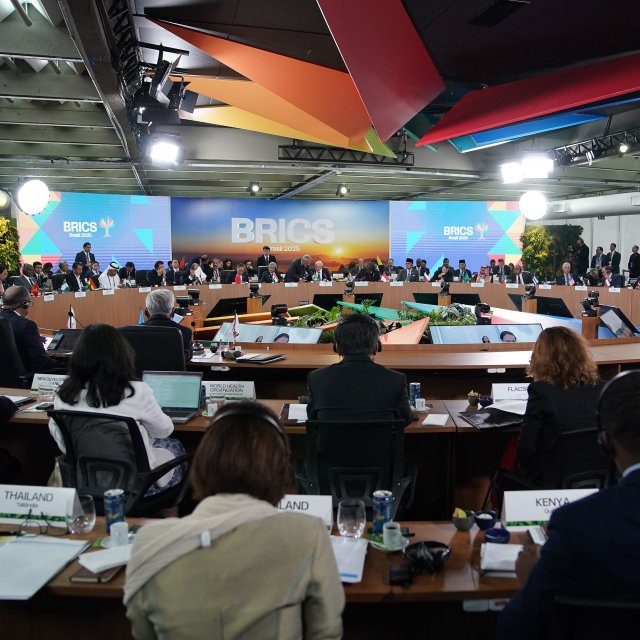 Lunes, 07 de julio de 2025
Canciller acompaña al Presidente en el jornada final de la XVII Cumbre de Líderes del BRICS
Lunes, 07 de julio de 2025
Canciller acompaña al Presidente en el jornada final de la XVII Cumbre de Líderes del BRICS
Foreign Minister Ampuero details at the UN the National Agreement for Araucania promoted by the Government

The National Agreement for Development and Peace in Araucania, promoted by the Government of President Sebastián Piñera, was described as a landmark and historic effort by the Minister of Foreign Affairs, Roberto Ampuero. The Chancellor said those words during his speech at the event "Good Stories on Human Rights", organized by the European Union, Chile and other countries, which took place this Thursday amidst the United Nations General Assembly.
In this activity, Chancellor Ampuero gave details of the plan, which addresses issues of education, health, social issues, identity and economic in the area. Thus, he indicated that the initiative is "the beginning of the construction of a common future, of encounter between all Chileans, regardless of their origin or condition. It is a good story that Chile wanted to contribute and share with you today. It is a story that at the same time contributes to the permanent struggle for the promotion of human rights.
In this context, the Secretary of State pointed out that "the Araucanía Region has been the object of numerous acts of violence throughout history, a situation that has worsened in the last decades, so that this area of southern Chile is today the most insecure and the one with the least comparative development in the country. Consequently, all the social effects deriving from the hindrance of economic activities, investments and also the marginalization of the most vulnerable sectors have deepened".
"La Araucanía, a region of southern Chile, historically inhabited by the Mapuche people, has been the object of successive confrontations," said the secretary of state, who added that "the struggle for territory has been one of the sources for confrontations not yet fully resolved".
Thus, he explained that the objective of the National Agreement convened by the Government is "to comprehensively address all the issues that affect insecurity, backwardness, economic stagnation and the worsening of social deficiencies in Araucania". This, "having as a priority the focus on guaranteeing the fundamental rights of all inhabitants of the Region, whether or not they belong to the Mapuche ethnic group, a native Chilean people".
Minister Ampuero pointed out that "the starting point has been a call for dialogue, meeting, inclusion and participation of all sectors of the region with the aim of reaching an agreement that involves all actors in that same region.
According to the Secretary of State, one of the issues "of greatest importance is the decision to agree on the recognition and appreciation of the indigenous peoples who inhabit the national territory. This is intended to take a step, I would say historic, long awaited by indigenous peoples," which "will act as a catalyst in the initiatives contemplated in this National Agreement".
"To promote and make this agreement a reality is a task that involves the whole country, it will require substantial public and private investments in infrastructure for a plan that contemplates improving more than one thousand one hundred kilometers of basic roads and more than 4 thousand 700 kilometers of indigenous roads, until 2026," said the Foreign Minister.
The Plan Impulso a la Araucanía de Chile contemplates a public investment of 8 thousand 43 million dollars for the period 2018 - 2026, to which must be added the resources provided by the private sector to the extent that the framework allows in the region.
"The most important thing, however, without ignoring the significant economic effort contemplated in the National Agreement, is the fact that the situation in Araucanía has become a national priority," concluded the Chancellor.
Artículos relacionados
 Lunes, 07 de julio de 2025
Canciller acompaña al Presidente en el jornada final de la XVII Cumbre de Líderes del BRICS
Lunes, 07 de julio de 2025
Canciller acompaña al Presidente en el jornada final de la XVII Cumbre de Líderes del BRICS
 Lunes, 07 de julio de 2025
Subsecretaria de Relaciones Exteriores se reúne con su par de Servicios Sociales
Lunes, 07 de julio de 2025
Subsecretaria de Relaciones Exteriores se reúne con su par de Servicios Sociales
 Domingo, 06 de julio de 2025
Canciller Alberto van Klaveren participa junto al Presidente Gabriel Boric en la XVII Cumbre del BRICS
Domingo, 06 de julio de 2025
Canciller Alberto van Klaveren participa junto al Presidente Gabriel Boric en la XVII Cumbre del BRICS








